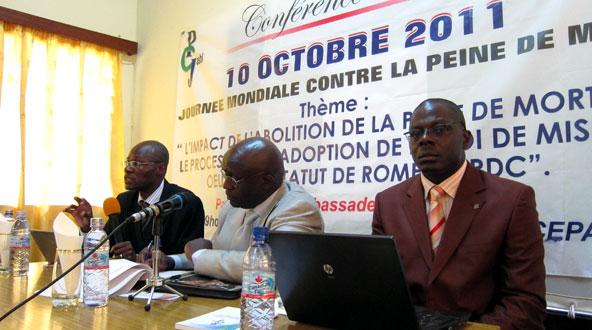
The death penalty and the situation in Africa debated in Kinshasa
World Day
The Congolese NGO Culture pour la Paix et la Justice (CPJ), a member of the World Coalition, organised a conference and debate on 10th October on “the impact of abolition of the death penalty on the process to adopt a law to implement the Rome Statute in the DRC” with help from the French embassy in Kinshasa.
The latest developments as regards abolition in the DRC actually occurred during the debate about the new law which should bring Congolese legislation into line with the treaty establishing the International Criminal Court which does not apply the death penalty. It is in this area that Congolese abolitionists have been most active over the last few months. One, the politician and Professor of Law, Nyabirungu Mwene Songa, defended a draft law for abolition during the debate.
The National Assembly rejected this draft law in November 2010.
The Minister for Justice, Luzolo Bambi, attended the conference on 10th October and reaffirmed that the position of the Congolese government was “progressive abolition of the death penalty”. However, he considered that renovation of the country’s prisons was a precondition to replacing capital punishment with prison sentences.
No “copy & paste” of Western culture
Professor Nyabirungu responded that abolition was a question of principle which did not require preconditions and that the necessary renovation of prisons could be included in the country’s reconstruction program which is already underway. “If we can build 12-lane roads, we can surely build prisons with four walls”, he said.
The debate, attended by students, lawyers, journalists and human rights activists, discussed the appropriateness of abolition in an African country such as the DRC.
In response to a member of the audience who considered that abolition was “copying & pasting” Western culture without taking African reality into account, Mr Marcel Wetch’Okonda from the Congolese Coalition Against the Death Penalty declared that “the reality is that there are many judicial errors in this country. We are also obliged to respect our international commitments. And we are unable to extradite Nkunda”.
He was referring to the rebel leader arrested in Rwanda, a signatory of the UN Protocol against the death penalty which prohibits the extradition of a suspect to a country which applies the death penalty.
Mr Liévin Ngondji, President of CPJ, added that traditional Congolese customs did not support capital punishment either. “Among our ancestors, those who had killed were banished, not executed”, he recalled.






